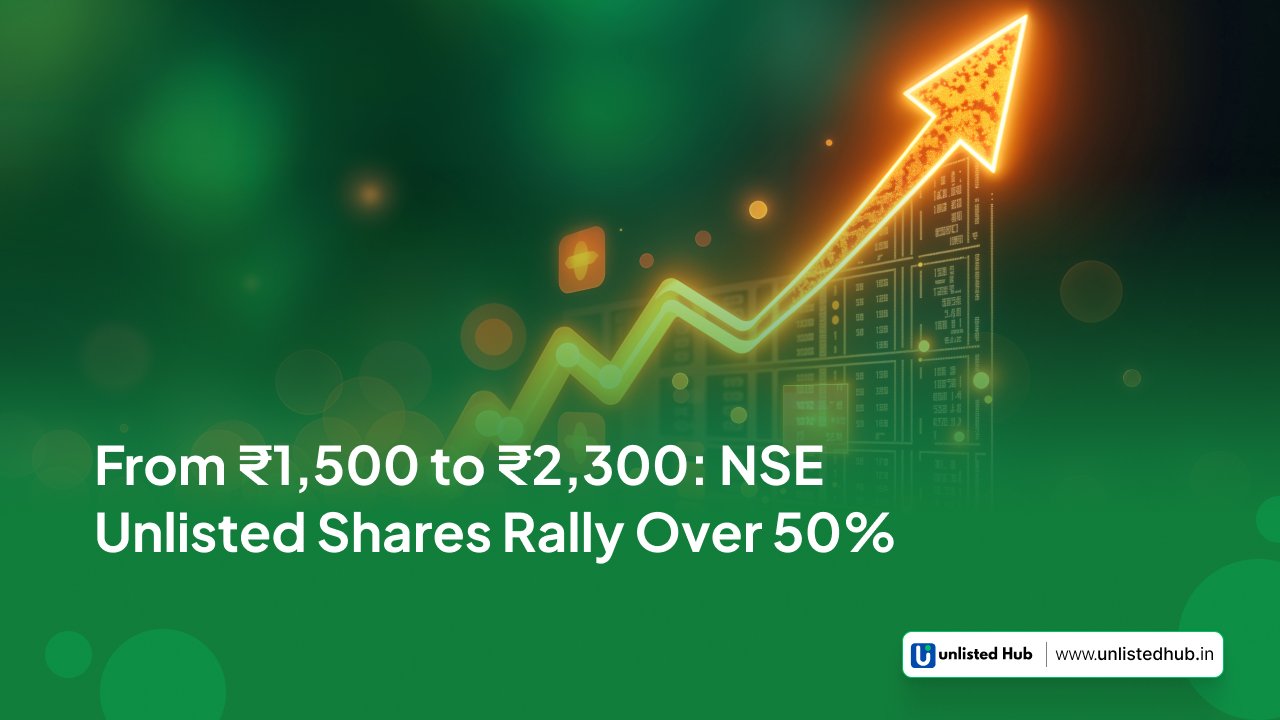
About NSE India Limited
Company Overview:
The National Stock Exchange of India (NSE), NSE Share established in 1992 and operational since 1994, has grown into India’s top stock exchange and holds a strong global presence due to its high trading volumes. It was the first in the country to launch a fully automated electronic trading system, which transformed India’s capital markets by making them more transparent, efficient, and accessible.
Based in Mumbai, NSE plays a vital role in the nation’s financial infrastructure, enabling trade across multiple segments, including equities, derivatives, debt instruments, and currencies. Over the years, it has become the preferred exchange for retail and institutional investors alike, thanks to its technological strength and regulatory reliability.
The exchange’s most recognized benchmark, the Nifty 50, was introduced in 1996 and reflects the market performance of 50 of India’s most prominent listed companies. NSE continues to innovate and grow, building a secure and dynamic trading ecosystem. With increasing interest in NSE unlisted shares ahead of its much-anticipated IPO, it remains a focal point for long-term investors seeking exposure to India’s financial future.
NSE Share Quick Overview Table:
| Parameter | Details |
| Full Name | National Stock Exchange of India Limited |
| Founded | 1992 |
| Headquarters | Mumbai, Maharashtra, India |
| Regulatory Body | Securities and Exchange Board of India (SEBI) |
| Key Services | Equity trading, derivatives, debt instruments, mutual funds, ETFs, IPOs |
| Major Index | NIFTY 50 |
| Market Share | One of the largest stock exchanges in India by volume and market capitalization |
| Technological Edge | First exchange in India to provide fully automated, screen-based trading |
| Subsidiaries | NSE Clearing Ltd., NSE IFSC Ltd., NSE Indices Ltd., NSE Academy |
| Ownership | Unlisted; backed by top Indian and foreign financial institutions |
| Upcoming IPO | In pipeline, awaiting regulatory approvals (as of 2025) |
Why Invest And Benefits
Invest in the Engine, Not Just the Ride — NSE Powers Every Trade.
The National Stock Exchange (NSE) is India’s leading and most trusted stock exchange, handling billions in daily trade volumes. It plays a pivotal role in shaping the country’s financial ecosystem. While NSE Share is currently unlisted, its shares are available in the private market, offering investors a rare opportunity to gain early exposure to one of India’s most profitable and systemically important financial institutions.
With its IPO expected soon, early investors in NSE’s share stand to benefit significantly once it becomes publicly traded.
Key Benefits of Investing in NSE:
1. Market Leadership & Monopoly Advantage
NSE Share commands over 90% market share in equity derivatives and a major share in cash markets, giving it a near-monopoly status in India’s trading landscape.
2. Consistent & High Profitability
With steady growth in trading volumes, listing fees, and technology-based services, NSE Share reports strong EBITDA margins and net profits year after year.
3. Own the Switchboard of India’s Markets
Investing in NSE means investing in the very infrastructure that supports thousands of companies and millions of investors in India.
4. Strong IPO Potential
NSE has earlier initiated its journey toward a public listing by submitting draft documents to SEBI. Once listed, investors in unlisted shares may gain significant capital appreciation.
5. Trusted and Transparent Governance
NSE operates under strict regulatory supervision, with cutting-edge surveillance, strong compliance mechanisms, and a reputation for technological innovation.
6. Low Risk, High Stability
As an exchange operator—not a trading entity—NSE Share benefits from transaction-based revenue, which is largely immune to market volatility.
7. Global Recognition & Partnerships
NSE Share is globally respected, has tie-ups with international exchanges, and is consistently ranked among the world’s top stock exchanges by trade volume.
8. Data & Technology-Driven Revenue Streams
Besides transaction income, NSE Share earns from index licensing, market data, co-location services, and trading technology, ensuring diversified and scalable income sources.
9. ESG & Sustainable Investing Trends
With increased focus on transparency and responsible governance, institutions are keen on companies like NSE Share that contribute to market integrity and sustainable finance.
Expert Opinion on NSE Share (Fact-Checked, June 2025)
NSE share is more than just a stock exchange—it’s the main platform that keeps India’s share and derivatives market running smoothly. With a dominant market share in derivatives (over 90%) and a leading position in cash equities, NSE’s revenue model is built on scale, stability, and advanced technological infrastructure.
— Rajan Mehta, Equity Analyst – Private Market Advisory
Strong Fundamentals & Consistent Profitability
NSE Share is widely regarded as a financially robust, cash-rich company with negligible or zero long-term debt. Its earnings are driven by diversified revenue streams, including trading and clearing fees, data licensing, and co-location services.
NSE Share EBITDA margins generally range between 65% and 70% (based on recent annual reports), which is among the highest for exchanges globally. Net profit margins are typically in the 35–40% range. NSE has reported consistent profitability, with revenue and profit growing significantly over the past five years.
Pre-IPO Opportunity
NSE’s IPO is highly anticipated but has not yet occurred as of June 2025. The company has received regulatory clearances and is expected to list shortly, but the exact timeline remains unannounced.
NSE’s unlisted shares are actively traded in the private market, and many private equity advisors view them as a strong pre-IPO investment opportunity. However, investors should be aware of the risks associated with unlisted shares, including illiquidity and regulatory uncertainties.
Investing in NSE’s unlisted shares means owning a part of the foundation that supports India’s entire stock market. With an IPO on the horizon, there’s potential for value unlocking, but investors should be mindful of the risks and lack of liquidity until listing.”
— Ankit S., Unlisted Shares Strategist
Safe Haven Investment
NSE operates as a platform: its revenues are primarily driven by trading volumes, not by market direction. This means NSE tends to generate stable revenues as long as there is trading activity, making it relatively resilient to market cycles.
However, no investment is entirely risk-free—unlisted shares carry additional risks such as illiquidity, regulatory delays, and potential changes in market sentiment.
Global Comparisons
Compared with global peers like NYSE (USA) and LSE (UK), NSE is among the top five exchanges worldwide by market capitalization and trading volumes.
NSE’s operational and technological standards are on par with global leaders. While some analysts believe NSE is undervalued in the unlisted market, its valuation has already appreciated significantly in anticipation of the IPO.
Final Takeaway
“For investors seeking to diversify with a high-quality, monopoly-driven infrastructure play, NSE unlisted shares represent a strong opportunity. With a proven track record, strong regulatory oversight, and an expected IPO, NSE is a standout in India’s private equity landscape.
Still, investors need to understand the risks and seek advice from financial experts before investing in unlisted shares.
— Shweta Patel, Senior Research Analyst – BFSI Sector
Management
Dr. Bimal Patel
Ian Desouza
Prajakta Powle
NSE India Limited
NSE India Limited
Registered Address
- ISIN: INE721I01024
- PAN: AAACN1797L
- MUMBAI
Faqs
Frequently Asked Questions
The NSE is awaiting approval from SEBI for its a whole lot-anticipated IPO. Once authorized, it’ll allow public investors to shop for shares in India’s biggest inventory change.
NSE’s unlisted stocks have seen a sizable upward thrust, jumping over 50% in a week, pushed by robust economic performance and anticipation of the imminent IPO.
Investing in unlisted shares incorporates dangers along with restricted liquidity, loss of regulatory oversight, and capacity valuation fluctuations. It’s critical to behave through due diligence earlier than making an investment.
As of May 28, 2025, NSE unlisted shares are buying and selling between ₹2,270 and ₹2,400, relying on the quantity bought.
The boom is due to strong quarterly results, positive expectations from the stock exchange, and a temporary pause during a period of market instability.
Analysts estimated that development from 6% to 26,500 via the stop of 2025, no matter concerns for marketplace evaluation and financial increase.
As of May 27, 2025, the pinnacle traded NSE shares by volume consist of Vodafone Idea, Reliance Power, Godha Cabcon, Suzlon Energy, and IFCI.
The NSE has introduced stricter guidelines for SMEs transitioning to the principal board, along with a minimal annual revenue of ₹1 billion and profitability in at least three of the past 3 years.
Articles, stories and more




